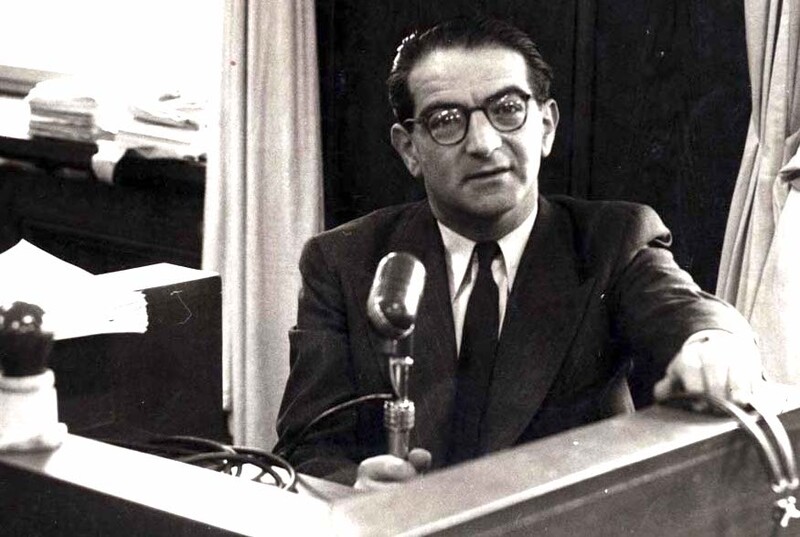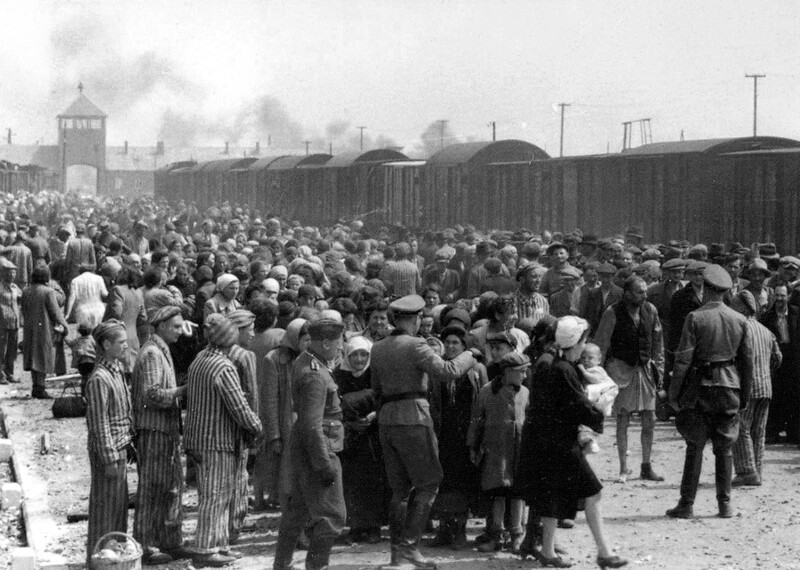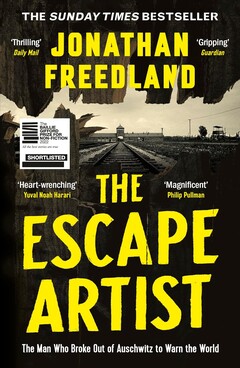The Electronic Intifada 22 September 2021

Owen Jones talking to the press.
ZUMA PressGuardian columnist Owen Jones markets himself as a leading leftist voice.
His profile on Twitter, where he has more than one million followers, emphasizes his “anti-fascist” credentials.
Why, then, did he just publish a defense of a Nazi collaborator? An Israeli judge once ruled that Zionist leader Rezső Kasztner was Holocaust architect Adolf Eichmann’s “catspaw,” but Jones seems to disagree.
On the blogging platform Medium earlier this month, Jones posted a response to a recent article I wrote for The Electronic Intifada.
My article reported on Jones’ duplicitousness during the fabricated “Labour anti-Semitism crisis,” which helped to oust Jeremy Corbyn as leader of the Labour Party.
It also showed how Jones smeared award-winning filmmaker Ken Loach.
Jones initially endorsed a Labour Party ban on a left-wing group Loach sponsors. He later changed tack, tweeting support for “Britain’s greatest living filmmaker,” before flip-flopping again and apologizing for his supportive tweet.

A tweet by Owen Jones, which he later deleted.
In his recent post, Jones changes his story yet again, now claiming that “I don’t support proscribing that organization” – Labour Against the Witchhunt.
He states, however, that Labour Against the Witchhunt members should have “disciplinary measures” imposed on them as individuals.
The reason Jones threw Loach under the bus, after previously supporting him, was because of renewed cries of outrage from Israel supporters over a play Loach directed more than three decades ago.
The play, Perdition, tackled the well-documented Zionist policy of collaboration with the Nazis during World War II.

Ken Loach directing Perdition in 1987. The play’s debut was canceled after a fierce campaign by the Israel lobby. (Diverse Productions/Channel 4)
The facts of the notorious real-life events the play is based on are laid out in my article to which Jones responded.
Oddly, Jones states that most of his post was not written by him. But the co-author remains anonymous, with Jones stating only that it was partly written by “a Jewish anti-Zionist.”
The blog post is actually a whitewash and denial of historical facts about Zionist collaboration with the Nazis, as well as an apologia for such collaboration.
“No, Jews did not collaborate in their own genocide,” Jones’ title disingenuously reads, the first of many strawman arguments.
This was not at all what my article claimed.
What it showed was that the Zionist leadership in occupied Hungary in 1944 worked closely with the Nazis, not the Jewish population as a whole.
More specifically, the article focused on the leading role in this collaboration played by Rezső Kasztner, Labor Zionism’s leader in Hungary during the Nazi occupation.
Zionism was a minority trend among Jewish people at the time but the Zionist policy of collaboration played an important role in helping the Nazis exterminate almost half a million Hungarian Jews during the Holocaust.
Kasztner was later a government official, broadcaster and parliamentary candidate in Israel. He was repeatedly accused of collaboration with the Nazis and questioned by Israeli police, before being cajoled into suing a pamphleteer for libel.

Rezső Kasztner speaking on Israeli state radio. Kasztner’s cooperation with Nazi war criminals in his native Hungary caused a national scandal after his actions came under the microscope during a 1954 libel trial in Israel. (Wikimedia Commons)
The pamphleteer had exposed Kasztner’s wartime collaboration with the Nazis.
Kasztner and his backers in the Israeli government sensationally lost the case, with the judge emphatically ruling that Kasztner had not been defamed because he had indeed collaborated with the Nazis at the cost of Jewish lives.
As Judge Benjamin Halevy put it in his 1955 ruling: “The Nazis’ patronage of Kasztner, and their agreement to let him save 600 prominent Jews, were part of the plan to exterminate the Jews.”
The ruling was partly overturned by Israel’s high court a few years later, in a 3-2 decision. This happened because Kasztner’s collaboration reflected the policy of the Zionist movement at the highest level, and the Israeli state could ultimately not convict itself.
But the appeal judges did not contest any of the material facts and in many cases justified Kasztner’s collaboration.
Although Jones and his anonymous co-author claim that Kasztner was “largely powerless in the face of a white supremacist machine,” the Israeli high court disagreed.
The judges were unanimous that Kasztner had in a “criminal and perjurious” manner testified in defense of SS officer Kurt Becher, an accused war criminal, during the Nuremberg trials after the war.
In fact, Kasztner defended several Nazis.
Kasztner’s Nazi collaboration
Was he “powerless” from 1945 to 1947, when the war was over and he traveled to Germany to testify on behalf of senior Nazis?
Clearly not. That was a deliberate act, one Kasztner said he had made with the knowledge and consent of the leaders of the Zionist movement.
Jones habitually fails to acknowledge that Zionism is a political movement – it is not an “identity,” but an ideology.
More specifically, it is a settler-colonial movement backed by imperialist “great powers” – first Britain, today the United States – for the removal of the indigenous Muslim and Christian Palestinian people from Palestine and their replacement with Jewish settlers.
Despite its claims, Zionism has never had any right to speak on behalf of all Jews.
But Jones and his anonymous co-author attempt to muddy the waters. Jones’ post asserts that “the categories ‘anti-Zionist’ and ‘Zionist’ did not necessarily mean exactly the same things” during the Holocaust as they do now.
Yet they fail to prove this or explain why it should matter. It’s irrelevant to the overwhelming evidence that Kasztner and other Zionist leaders collaborated with the Nazis.
Silencing Jewish survivors
Jones and his co-author try to cast doubt on Kasztner’s record with a series of rhetorical questions about “so-called collaborators.”
They claim that “focusing on ‘collaboration’ can easily serve a right-wing narrative which victim-blames and where members of the oppressed group are deemed ultimately responsible for their own oppression.”
But those most determined to expose Kasztner’s collaboration after the war were Jews who had managed to survive his betrayal that sent so many others to their deaths.
Now Jones – and his anonymous co-author – are disingenuously stepping in to defend the Nazi collaborator from his Jewish victims, while claiming that they are defending Jews.
In a further effort to justify silencing Jewish survivors and victims of the Nazis, Jones and his anonymous co-author question whether the testimonies of Hungarian Jewish survivors who exposed Kasztner’s crimes are “the stories that we on the left really want to be telling.”
In other words, they grotesquely try to market the defense of Nazi collaborators and the silencing of Jewish survivors who exposed them as the proper “left” position.
Holocaust revisionism
In another soft-sell, they misleadingly describe the Nazi collaborator Kasztner as “a Hungarian Jew who escaped the Holocaust, settled in Israel and became involved in Labor Zionist politics.”
But this reverses the chronology: Kasztner was already an influential leader of the Labor Zionist movement in Hungary years before his move to British-occupied Palestine after the war.
Jones and his co-author thus give the impression that Kasztner only later became a Zionist and moved to Israel due to his experiences under the Nazis in Hungary.
In fact, Kasztner was an active Zionist all his adult life, at least as early as 1925, years before the rise to power of the Nazis.
Jones and his anonymous co-author claim that Kasztner was only “accused” of collaboration with the Nazis. They assert that “there is no credible evidence that Kasztner had any agency to save any more Jews.”
This is nothing less than Holocaust revisionism.
They leave out the fact that the Israeli judge in 1955 ruled that Kasztner did indeed actively collaborate.
The trains to Auschwitz
Instead Jones and his co-author claim that if Kasztner had done anything “he did so facing the kinds of moral questions that most of us desperately hope we will never actually have to answer.” In other words, they seem to be saying, who are we to judge?
Let’s consider the record.
“One cannot estimate the damage caused by Kasztner’s collaboration and put down the number of victims which it cost Hungarian Jews,” Judge Halevy wrote.
“These are not only the thousands of Jews in Nodvarod or any other community in the border area, Jews who could escape through the border, had the chief of their rescue committee fulfilled his duty toward them.”
In other words, according to the Israeli judge, Kasztner could have saved countless Jewish lives simply by warning them of the fate he knew awaited them.
Instead, Kasztner remained silent because he made a deal with the Nazis that he would help prevent a rebellion among Hungary’s Jewish masses who were marked for death. In exchange, he would be allowed to handpick a group of prominent Jews and Kasztner family members to leave the country safely on a train.

Hungarian Jews being sent to the Auschwitz death camp in May or June 1944. The collaboration of Zionist leaders played a key role in helping the Nazis murder almost half a million Jews during the final phase of the Holocaust. (Wikimedia Commons)
Kasztner, however, did not stop at silence. As recounted by Paul Bogdanor – a British Jewish historian who set out to write a book defending Kasztner, but ended up concluding that he was indeed a willing collaborator – Kasztner’s betrayal of Hungarian Jews went much further.
“It was that Kasztner had instructed local Jewish leadership to mislead them, and to deceive them into boarding the trains to Auschwitz,” Bogdanor told The Times of Israel in 2016.
“After Kasztner had visited the local communities, the leadership spread false information – which he had given them – that the Jews were going to be resettled inside Hungary.”
But according to Jones and his co-author, this horrific complicity with the Nazi extermination of Jews was the action of a man making finely balanced moral judgments.
That is not where their whitewashing ends.
Preference given to Zionists
Jones and his co-author take issue with my statement that those who escaped from Hungary on Kasztner’s train were “mostly fellow Zionists.”
But the source for this fact – as previously reported – is Ben Hecht’s 1961 book Perfidy.
Hecht was a right-wing Zionist and a journalist who later became a famous Hollywood scriptwriter and producer. He followed Kasztner’s libel trial closely and quotes from the transcripts extensively.
Decades later, the book is still one of the best sources on the trial, the author’s anti-Palestinian biases notwithstanding.
Hecht explains that with Nazi approval, Kasztner had chosen “388 Jews from [his hometown] Kluj alone. They are the ‘best,’ the most important members of Kluj Jewry – mainly Zionists.”
Hecht is not the only source.
Indeed, Judge Halevy ruled that Kasztner had considered his train “a success for Zionism.”
Another Zionist source agrees.
Andre Biss, who worked with Kasztner in Hungary, writes in his book A Million Jews to Save (as cited by Lenni Brenner in Zionism in the Age of the Dictators, pages 285-6) that “the most numerous group” who boarded the train were “Kasztner’s pride – the Zionist youth.”
A fourth source, the liberal Zionist historian Tom Segev, notes in his book The Seventh Million “the preference given to Zionist leaders in awarding places on the train since these leaders were headed for Palestine.” Segev adds that Israeli high court judge Shimon Agranat described this as “a rational principle.”
Eichmann’s catspaw
Another of the claims in Jones’ post is that the Kasztner train “came to be known as ‘Noah’s Ark’ as it deliberately saved a diverse and fairly representative cross section of the Hungarian Jewish community.”
This attempt to deploy a New Labour-style celebration of diversity and multiculturalism in an effort to whitewash Kasztner’s Nazi collaboration appears to be derived from the Wikipedia page “Kasztner’s train.”
Jones and his co-author leave out one crucial fact: “Noah’s Ark” was Kasztner’s own self-justifying description of the train in his 1946 report to the Zionist Congress.
By omitting this fact, Jones and his anonymous co-author are misleadingly presenting Kasztner’s own self-serving propaganda as if it were a widely held assessment.
They also claim that my article for The Electronic Intifada “overemphasizes Jewish agency” by arguing that a Jewish uprising – or mass escape efforts – in Hungary could have been more successful than the doomed Warsaw Ghetto uprising in Poland the year prior.
As noted, the Israeli judge found that had Kasztner warned the Jews of Hungary what awaited them, many might have escaped.
Holocaust architect Adolf Eichmann “did not want a second Warsaw. For this reason, the Nazis exerted themselves to mislead and bribe the Jewish leaders,” Halevy ruled.
“The personality of Rudolph [Rezső] Kasztner made him a convenient catspaw for Eichmann and his clique.”

Judge Benjamin Halevy, left, ruled that Kasztner had collaborated with the Nazis. Halevy was later on the three-judge panel that sentenced Holocaust architect Adolf Eichmann to death in 1961. (Wikimedia Commons)
The judge certainly believed that resistance and escape were real possibilities. The reality in Hungary in 1944 was quite different from that in Poland in 1943. By 1944, the Nazis were losing the war and the Red Army was advancing from the east.
“Dozens of thousands of Jews were guarded in their ghettos by a few dozen police,” the judge wrote. “Yet even vigorous young Jews made no attempt to overpower these few guards and escape to nearby Romania.”
There were no resistance activities, Halevy stated, as “Jewish leaders did everything in their power to soothe the Jews in the ghettos and to prevent such resistance activities.”
By contrast, it had taken 2,000 heavily armed Nazi troops to crush the Warsaw Ghetto uprising.
In 1961, Halevy was one of the three Israeli judges who sentenced Eichmann to death, after he had been captured by the Mossad in Argentina the previous year and put on trial in Jerusalem.
The Zionist movement has since its beginnings shared with anti-Semites the view that European Jews are not really Europeans and are rather Jews who happened to find themselves in Europe.
Theodor Herzl, the founder of Zionism, infamously predicted that “the anti-Semites will become our most dependable friends, the anti-Semitic countries our allies.”
In April 1933, only months after Hitler took power, German Zionist federation chairman Kurt Blumenfeld argued that “there exists today a unique opportunity to win over the Jews of Germany for the Zionist idea.”
Today, Israeli leaders appear just as happy to make common cause with anti-Jewish forces, including Hungary’s Viktor Orbán and extremist pastors like John Hagee. Israel has even armed an explicitly neo-Nazi militia in Ukraine.
Rehabilitating a Nazi collaborator
As Columbia University’s Joseph Massad has explained, “Zionist leaders consciously recognized that state anti-Semitism was essential to their colonial project,” and that their declarations to that effect “were not slips or errors but indeed a long-term strategy that Zionism and Israel continue to deploy.”
Jones and his allegedly “anti-Zionist” anonymous co-author would presumably not defend a Nazi collaborator in any other context.
But it seems they are willing to do so when that collaborator was also a Zionist and when doing so serves Israel’s interests today.
Jones’ post even claims that Kasztner “was involved with various rescue efforts which helped thousands upon thousands of Jews.”
Paul Bogdanor views such efforts to rehabilitate and whitewash Kasztner with contempt.
To claims that Kasztner rescued thousands of Jews, the historian responded in 2016: “All the rescue claims are without substance, whatsoever.”
Bogdanor said that he has met Hungarian Holocaust survivors “who are extremely distressed by the campaign to rehabilitate Kasztner.”
“Kasztner did know that Jews were being exterminated, he knew and he repeatedly admitted it,” Bogdanor added. “His defenders have to say he didn’t know, which is contrary to the facts.”
To the list of defenders of this Nazi collaborator who helped Hitler kill the Jews of Hungary, we can now add The Guardian’s very own Owen Jones.
Additional research by Ali Abunimah.
Asa Winstanley is an investigative journalist and an associate editor with The Electronic Intifada.






Comments
Throwing people under a bus
Permalink Philip Wagstaff replied on
An excellent deco striction of Quisling Jones but have you ever explained how many comrades Jeremy and John threw under a bus for which they have never acknowledged or apologised for?
appeasement always fails
Permalink tom hall replied on
This is why I can't work up any enthusiasm for those two today. They chose appeasement. Their day is done, and when I see others seeking comfort and inspiration, turning to them for counsel on how to fight the right, I ask myself, "What does it take to open peoples' eyes?"
rankest of the rank
Permalink tom hall replied on
Thanks for this much-needed rebuke to the cant, hypocrisy and lies peddled by Owen Jones and his employers at the Guardian. I can only add that offering his platform to a ghost, ie an anonymous figure promoted as a "Jewish anti-Zionist", represents a new low for this well-remunerated boot-licker. It's probably the sort of thing that occurs all the time in his trade, but I can't think of another example of a putative author actually admitting he writes very little of his own column. And refusing to name the real contributor while assuring readers of that person's bona fides simply underscores the rotten position Jones now occupies in British churnalism.
anti-semite?
Permalink Peter Purich replied on
Aren't Jones and his allegedly “anti-Zionist” anonymous, well, collaborator, have broken the International Holocaust Remembrance Alliance (IHRA)? By that completely broken and rejected mess claims that to say "I am anti-Zionist" makes Jones and his collaborator ... anti-Semites?? If Herzl was here, he would say "Yes! Well done, Jonesy! Keep up all the hard work!"
The truth about Kasztner
Permalink Abe Hayeem replied on
Brilliant analysis setting the record straight. This is the sort of subject that is verboten in pro-Zionist circles and is the sort of knowledge that the IHRA definition was set up to silence or conceal. This subject matter should be taught in schools so the the clear evidence of Zionist collaboration is seen in the context of setting up Zionist colonialisation of Palestine. Asa does not mince his words and provides incontrovertible evidence that Owen Jones seems ignorant of, or determined to undermine.
Kasztner and collaboration
Permalink tony greenstein replied on
Very good article. Owen Jones's defence of a collaborator with the Nazis plumbs the depths. There is no limit to his apologia for the Zionists, even whilst 'supporting' the Palestinians. Just a few comments.
1. I have also written a detailed response to Jones and his 'anti-Zionist' Jewish friend. It is here
https://azvsas.blogspot.com/20...
2. Be aware that Paul Bogdanor's book is problematic. He does indeed come to the conclusion that Kasztner was a Nazi agent. But his book is aimed at exonerating the Zionist movement by claiming in essence that Kasztner was acting alone and agains the Zionist movement, whereas in fact he was the representative of the Jewish Agency and in that capacity he testified at Nuremburg in favour of Hermann Krumey, who organised the extermination of nearly 1/2 million Hungarian Jews.
3. A key component of Kasztner's collaboration was his suppression of the Auschwitz Protocols written byy Rudolph Vrba and Alfred Wetzler, two Jews who escaped from Auschwitz on 10 April 1944 specifically to warn Hungarian Jewry what was in store for them.
4. Kasztner deliberately suppressed the Protocols along with other Zionists. When the Protocols were publicised by the Swiss press and the BBC etc. the pressure was such that the ruler of Hungary, Admiral Horthy called a halt to the deportations on July 6. This saved 200,000 Jews in Budapest whom Eichmann had intended to deport. Kasztner had been making plans to arrange another train over their dead bodies.
5. The role of the Zionist movement goes far beyond Kasztner and his collaboration. I am presently writing a book on this subject but in essence leading Zionists WELCOMED the Nazis to power as a golden opportunity to build their state.
Read my blog article for further details
3. The culpability of the Zionist movement goes
Jones + the Guardian are a perfect fit
Permalink Thomas Suarez replied on
Thank you, Asa, for this excellent piece. Adding to the irony, Kasztner's assassins were allegedly left-over Lehi members, who had themselves been quite happy to attempt collusion with the Italian fascists.
Zionist anti-Semitism
Permalink Frank Dallas replied on
The history of Zionist anti-Semitism is long and deplorable, and of course, vigorously denied and diligently concealed by the Israeli lobby. Herzl suggested mass conversion of Jews to Christianity. Why? because this was his view of Jews: "The Yid is a hideous distortion of the human chaarcter, something unspeakably low and replusive...We'll breathe more easily, having once got rid once and for all of these people who, with furtive shame, we were obliged to treat as our fellow tribesmen.." This is Herzl calling for Jews to be "got rid of". Where does this come from? He made a distinction between a Jew and a Zionist. The same distinction is found in Jabotinsky. These are very confused people, blaming Jews for their historical oppression, trying to rescue them by the creation of a new category which implies superiority in all areas. The facts are that Jews have been subjected to ignorant prejudice for centuries in many places. They are not to blame any more than Muslims are culpable for Islamophobia. As Kafka shows us, accusation engenders guilt. Herzl seems to have fallen into this mentality. His prescriptions were consequently disastrous. The Jews didn't need an exclusive State, but democracy and equal rights. Consider how they flourish in contemporary America. Not because there is a Jewish State, but because they are protected by the law and cultural acceptance (unlike the black population). Kasztner is a classic example of the mentality expressed in Herzl's despicable and distorted view: save the superior Jews, let the rest perish. What is a superior Jew? One who has shaken off the simple definition of Jew to assume the phoney one of Zionist, ie the idea of messianic entitlement and intrinsic superiority. It's worth recalling Flapan's observation too that there has always been a fundamentalist current in Judaism which is racially prejudiced, particularly against Arabs.
Theodor Herzl Quote
Permalink Rodger replied on
The Herzl quote you call attention to in your post -- "The Yid is a hideous distortion . . ." -- deserves widespread acknowledgement and condemnation (as does your suggestion that Herzl recommended some Jews convert to Christianity). Could you refer me to texts where I may find this quote (and his suggestion that some Jews should convert to Christianity), so that I may share these repellent views of Herzl, when pertinent, with readers in any future articles I might write?
Herzl's Antisemitic Broadside
Permalink Rodger Kroell replied on
I ran down the quotations referred to above. They are included in an article Herzl wrote on Oct. 15, 1897 for Die Welt [The World], a pro-Zionist newspaper Herzl founded in Vienna in 1897. From 1897 to 1914 Die Welt was apparently the principal organ of the Zionist movement. The article was titled "Mauschel," which tranlates to "Mouse" (German slang for "Yid" or "kike," according to Herzl's biographer Ernst Pawel, p. 345). The quotations can be found in Pawel's, The Labyrinth of Exile: A Life of Theodor Herzl, New York: Farrar, Straus & Giroux, 1989, pp. 344-346. The antisemitic tirade Herzl launched in this article, an essay in which he distinguishes Zionists from fellow Jews who are "anti-Zionists" ("Yids" or "kikes"), was set in motion by the refusal of a group of "small-minded [Jewish] financiers" (344) -- Sassoon, Montagu, Warburg, Oppenheim and Seligmann (345) -- who declined to underwrite his Zionist project by establishing a "Jewish Colonial bank" (344). The "Mauschel" ("Yid" or "kike") is identified in this article as any "fellow tribesman" who "rejects us," that is, Herzl's "Society of [Zionist] Jews" (344). They refused to underwrite Herzl's Zionist project, he writes, out of "craven fear" (345).